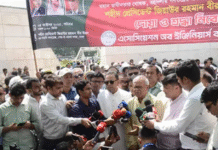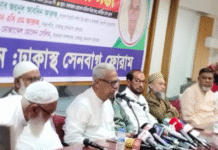Prothom Alo
Dhaka

The National Citizens Party (NCP) has opposed the Constitutional Reform Commission’s recommendation to change the name of the state. However, the party has agreed with the proposal to replace nationalism, socialism, and secularism with ‘equality, human dignity, social justice, pluralism, and democracy’ as the fundamental principles of governance in the constitution. The NCP has also emphasised the need to clearly define pluralism.
On 23 March, the NCP submitted its written opinion on the recommendations of five reform commissions, including the Constitutional Reform Commission, to the National Consensus Commission. Out of 166 key recommendations, the NCP fully agreed with 113 and partially agreed with 29 recommendations.
The BNP also submitted its opinion to the Consensus Commission on the same day, revealing several fundamental differences between the two parties’ stances. While the BNP does not support changes to the constitution’s basic principles, the NCP does.
The BNP favours maintaining a five-year parliament term, whereas the NCP supports the Reform Commission’s recommendation to reduce it to four years. Additionally, the BNP opposes the recommendation that the same person cannot be both the leader of a political party and the leader of parliament, while the NCP takes a different stance on this issue.
The NCP has proposed a mixed electoral system. It supports the existing seat-based system in the lower house (parliament) but advocates for a proportional representation system in the upper house (National Assembly). Under this system, if a party secures 35 per cent of the national vote, it would receive 35 seats in the upper house. Voters would cast their ballots only once.
Our key difference with the BNP is that the BNP believes an elected parliament has the authority to make fundamental constitutional changes. In contrast, we believe that if such fundamental changes are to be made, an elected Constituent Assembly is the most logical and appropriate mechanism.
NCP Reform Coordination Committee Coordinator and party joint convener Sarwar Tushar
The Constitutional Reform Commission has recommended that all local government elections be conducted under the direct supervision of the election commission and that a Local Government Commission be established, comprising a Chief Local Government Commissioner and four commissioners.
While the NCP opposes these two provisions, it supports implementing all other reforms either through a Constituent Assembly election or a hybrid model Constituent assembly-cum-parliament where the elected Constituent Assembly would automatically transition into a legislature after drafting the constitution.
When asked about their stance, NCP Reform Coordination Committee Coordinator and party joint convener Sarwar Tushar told Prothom Alo on Thursday, “We agree with many of the Reform Commission’s recommendations. However, our key difference with the BNP is that the BNP believes an elected parliament has the authority to make fundamental constitutional changes. In contrast, we believe that if such fundamental changes are to be made, an elected Constituent Assembly is the most logical and appropriate mechanism.”
NCP’s stance on reform recommendations
The National Citizens Party has agreed with several recommendations submitted to the Consensus Commission, including reducing the parliamentary term to four years. The party also supports the Reform Commission’s proposal to establish ‘equality, human dignity, social justice, pluralism, and democracy’ as the fundamental principles of the constitution.
The NCP has proposed a more precise definition of pluralism: “Pluralism will mean a multi-ethnic, multi-religious, multi-lingual, and multicultural country.”
The recommendation states: “Bangladesh is a pluralistic, multi-ethnic, multi-religious, multi-lingual, and multicultural country, where the coexistence and due dignity of all communities will be ensured.”
While agreeing with this, the NCP has proposed a more precise definition of pluralism: “Pluralism will mean a multi-ethnic, multi-religious, multi-lingual, and multicultural country.”
The Reform Commission has recommended removing secularism, socialism, and nationalism as fundamental principles of the constitution, along with deleting Articles 8, 9, 10, and 12. The NCP also supports this proposal.
Regarding parliamentary roles, the commission recommended that a member of the lower house should not hold more than one of the following positions: Prime Minister, Leader of Parliament, or Head of a political party.
The NCP holds that the Prime Minister and Leader of Parliament can be the same person but should not serve as the head of the cabinet. Instead, they should be considered ‘First Among Equals’ among ministers.
The commission has also suggested forming a National Constitutional Council (NCC), consisting of representatives from the three branches of state, including the President and Prime Minister.
According to the recommendation, NCC members will remain in office even if parliament is dissolved, until the Chief Adviser of the interim government is sworn in. The NCP agrees with this but has suggested that appointments to constitutional positions, including the Chief Election Commissioner, should be approved by a two-thirds vote of NCC members.
The NCP has also endorsed the proposal for an interim government, suggesting that the NCC could function as an election-time administration.
One of the other NCC members, except the President and the previous government’s Prime Minister, could be appointed as Chief Adviser. The party has recommended a tenure of 70 to 75 days for this government. Additionally, the NCP has expressed support for electing the President based on the majority vote of the District Coordination Council.










